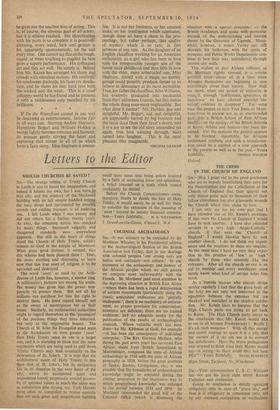COLONIAL ARCHAEOLOGY
Sia,—It was salutary to be reminded by Sir Mortimer Wheeler, in his Presidential address to the Archaeological Section of the British Association last Friday, that in our dealings with colonial peoples 'our strong suits are justice and sanitation—not culture.' In our treatment of the archaeology and history of the African peoples whom we still govern we compare most unfavourably with the French. Sir Mortimer paid most attention to the depressing situation in British East Africa —where there has been a rapid deterioration of ancient monuments (particularly along the coast); antiquities' ordinances are 'pitifully inadequate.'; there is no machinery of enforce- ment; no proper provision for conservation; museums are deficient; there arc no trained archivists; and no adequate media for the publication of the results of archaeological research. Where valuable work has been done—by Mr. Kirkman at Gedi, for example —it has been the consequence of individual enterprise. The Rev. Gervase Mathew, who during the past seven years has surveyed East African states from British Somaliland to Mozambique, compared the state of African archaeology in 1954 with the state of African geography in 1854, before the great journeys of Speke, Burton, Livingstone, etc.; it was possible that the botuidaries of archaeological knowledge might be extended during the coming generation in the impressive way in which geographical knowledge was enlarged in the period between 1854 and 1899. Sir Mortimer commended the good will of the Colonial Office (which is discussing the situation with a special committee ot the British Academy), and spoke with particular warmth of the understanding and interest shown by the Governor of Uganda. Mean- while, however, a minor Verres can still decorate his bathroom with the spoils of mosques; and Public Works Departments con- tinue to hew their way, unhindered, through ancient city walls.
This neglect of past African cultures, as Sir Mortimer rightly stressed, is a serious political error—above all at a time when Africans themselves arc beginning to care increzisingly about their history. How shall we stand, when our period of authority is over, if, through indifference, ignorance, or impotence' we have allowed essential his- torical evidence to disappear ? For some time the project to turn Fort Jesus at Mom- basa from its present use, as an overcrowded gaol, into a British School of East African Studies—on the analogy of the British Schools at Rome, Athens and Ankara—has been dis- cussed. For the moment the project appears to be blocked: regrettably, for Africans understand symbols, and such a transforma- tion could be a symbol of a new approach to the present as well as-to the past.—Yours
Oxford


































 Previous page
Previous page